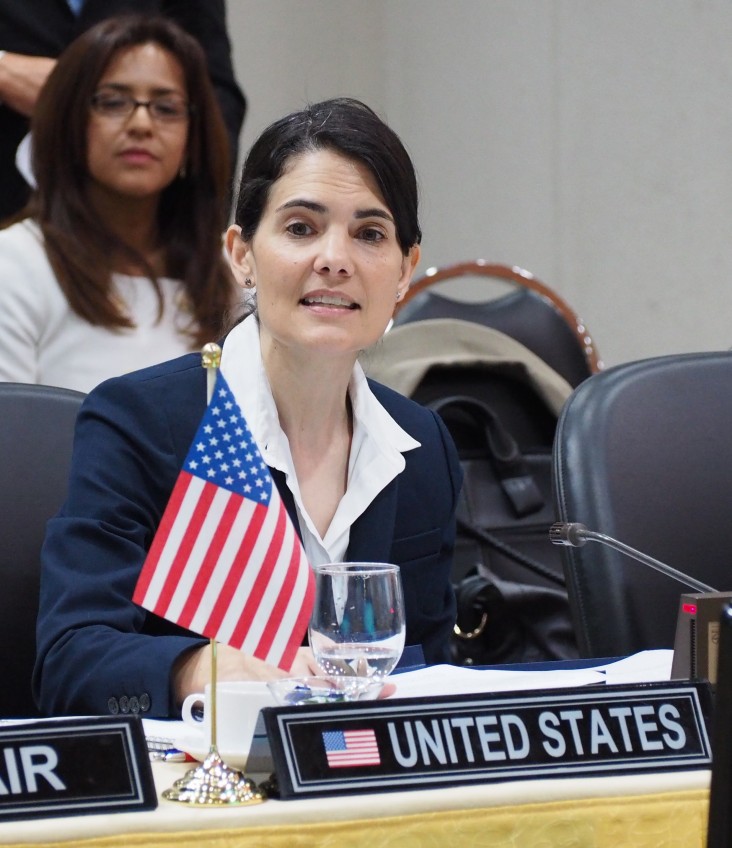
Thank you all for allowing us to add to our productive discussion this morning and share some news about an exciting new public-private partnership that will support equitable and sustainable growth within the ASEAN Economic Community.
In the increasingly integrated regional economy, businesses, especially small and medium-sized enterprises, will need to understand the benefits of the AEC. Along with that understanding, they will also need access to technology, innovation and finance that will help them take advantage of the opportunities the AEC offers.
But businesses are made up of more than technology and capital. They are run by people. Businesses will also need a strong and vibrant workforce that will help them innovate and grow. And as you all know, ASEAN’s focus on human resource development is particularly important for the workforce of the newer ASEAN member states – Cambodia, Laos, Myanmar, and Vietnam. The good news is that these countries have booming economies and industries in ASEAN targeted sectors, such as tourism, food processing, electronics, and construction.
In a recent USAID study of employers in the Mekong region, nearly 80 percent indicated that they are currently looking to hire new staff. The most common reason for hiring is to expand the scope of their businesses.
However, in these countries, skilled workers are in high-demand, but in short supply. The reason for this imbalance is a skills discrepancy between graduates of post-secondary education institutions and the positions employers seek to fill. In fact, only 15 percent of employers reported that education institutions are doing a good job in preparing the workforce.
Empowering young women in the workforce is also essential. Currently, over 40 percent of employers report that the sex of an employee affects their selection for skilled labor positions. As a result, across the Lower Mekong region, women participate in the skilled labor force at rates much lower than men. This is despite high rates of women working in assembly and low-skilled manufacturing plants. This needs to change.
A recent UN Women report concluded that removing barriers to full participation of women in the workforce in the Asia-Pacific region could boost the economy by $89 billion dollars every year. The United States is committed to addressing these imbalances through developing essential skills in youth and creating an environment for young women to thrive in school and in the workplace. This includes training in hard skills, of course. But just as importantly training includes work readiness skills, including teamwork, entrepreneurship, adaptability, and critical thinking.
To this end, we have partnered with U.S. companies and SMEs in the region to better link the supply of labor to the needs of employers. We see this as a critical component of the partnership focus I mentioned earlier today for cultivating emerging leaders in ASEAN.
That is why I am pleased today to announce a new partnership between USAID and National Instruments valued at $4.5 million dollars of in-kind support.
Over the next five years, USAID and National Instruments will work together to educate and develop tomorrow’s and today’s workforce in the Lower Mekong countries. The end goal is supporting ASEAN integration, sustainable economic growth, SME development, and youth employment. National Instruments will provide discounted and in-kind software, services, and hardware.
This assistance will drive workforce development, indigenous innovation and entrepreneurship, SME competitiveness, and enhanced education in engineering, and in science and technology. This partnership will ultimately help develop future ASEAN leaders. These leaders will drive sustainable and equitable growth in and serve as the agents of change to narrow the development gap.
This partnership will be carried out by two U.S. government projects -- the USAID Connecting the Mekong through Education and Training (or USAID COMET) project, and the USAID ASEAN Connectivity through Trade and Investment (or ACTI) Project. You all are familiar with the ACTI project, in particular its work to support the ASEAN Single Window and SMEs in the region.
But you may not yet have heard as much about the USAID COMET program. It is a five-year, $12.3 million dollar project that will help universities and vocational centers to increase the number of skilled workers in the fields of science, technology, engineering, mathematics, accounting and tourism. These fields directly support the ASEAN Mutual Recognition Arrangements in the Lower Mekong countries.
The program was presented to the ASEAN Senior Officials on Education a few weeks ago in Hanoi and is now pending endorsement. Over the next five years, the project plans to cooperate with 100 universities and vocational colleges to bring technology and online resources to vocational and higher education institutions and learners.
The project will train university and vocational center instructors in customized curriculums developed jointly with the private sector in these high-demand fields. The training will utilize modern strategies for complementing online learning with in-person classes. The project aims to help 100,000 youth acquire the skills they need to thrive in the AEC.
The project will also promote the value of diversity to employers in leading industries, especially since research indicates that diversity directly equates to productivity. And to expand on our work in ACTI to support SMEs, this partnership will provide access to state-of-the art technology and innovation services provided by National Instruments for targeted high-potential SMEs in the program.
To me, this partnership highlights the best of what the United States brings to the table for youth development and for economic growth. We are serious about quality education that enables young people to find jobs. We are serious about technology and innovation, and how to foster it. And we are serious about the benefits of public-private partnerships.
So that you can now find out more about how this partnership will help promote a stronger workforce and boost SME development in ASEAN region, we will hear more from National Instruments. I am certain that you will agree with me that this is exactly the kind of program that brings the best available resources to ASEAN-U.S. cooperation.
Thank you.







Comment
Make a general inquiry or suggest an improvement.